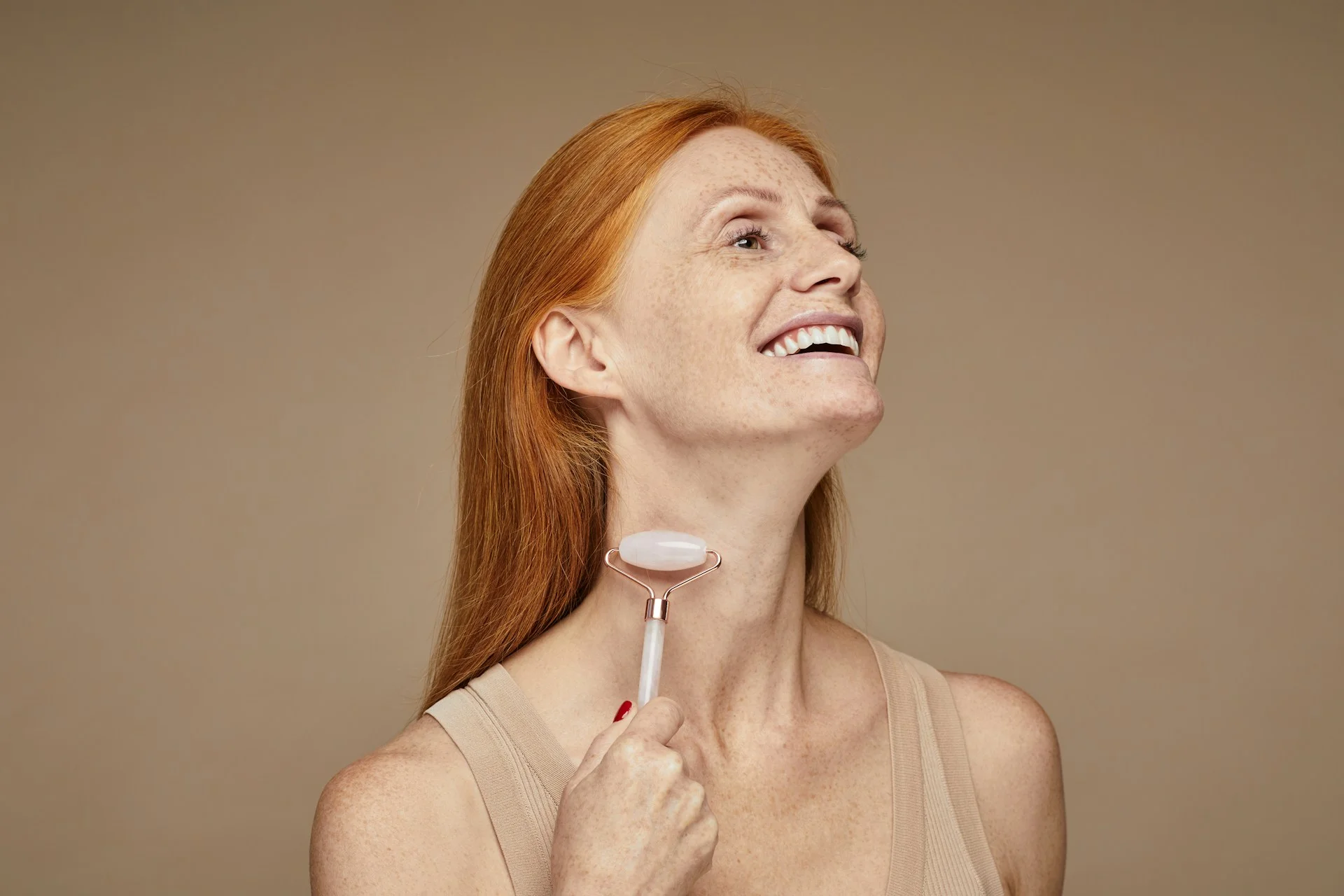Natural Remedies & Vitamins for Perimenopause
Navigating the transition into perimenopause can be challenging, but the right approach can make it easier. By focusing on vitamins for perimenopause, natural treatments, and lifestyle adjustments, you can manage symptoms and improve your quality of life.
From changes in diet to targeted supplements, this guide will help you understand how to regain balance and vitality during this phase. Red Leaf Wellness offers comprehensive programs to support your journey.
What Is Perimenopause?
Perimenopause is the transitional stage leading up to menopause, often starting in your late 30s or early 40s. During this time, estrogen production fluctuates, which can cause symptoms like irregular periods, mood swings, and perimenopause bloating. This phase can last anywhere from a few months to over a decade, depending on individual factors.
One common question we hear is, “Can you get pregnant during perimenopause?” The answer is yes! While ovulation becomes unpredictable, it’s still possible to conceive. If you’re not ready for this, consider speaking to your doctor about birth control options.
Understanding the distinction between perimenopause vs menopause is also essential. Perimenopause marks the lead-up to menopause, while menopause itself is confirmed after 12 consecutive months without a period.
Curious to learn more about menopause? Check out our collection of top 9 books on menopause.
Learn More About Perimenopause

Perimenopause is more than just the lead-up to menopause—it’s a complex phase of transition that varies significantly from one person to another. It’s driven by fluctuations in estrogen, a hormone that regulates many bodily processes. These hormonal changes can affect everything from your mood to your metabolism, making it essential to understand the nuances of this stage.
What Causes Perimenopause?
Perimenopause begins as your ovaries gradually reduce estrogen production. This natural decline can be influenced by factors like genetics, lifestyle, and overall health. For some women, stress, diet, or even environmental toxins can accelerate the onset or intensify symptoms.
It’s also important to note that perimenopause doesn’t have a set timeline. For some, it might last just a few months, while for others, it can stretch out for more than a decade. The menopause age calculator is a tool that can estimate when you might reach menopause, but every woman’s journey is unique.
Learn about the top 10 vitamins to balance hormones to ease your transition through natural life stages.
Common Symptoms of Perimenopause
The symptoms of perimenopause can range from mild to severe, often affecting physical, emotional, and mental health. Common issues include:
- Irregular periods: Changes in cycle length and flow are often the first sign. Other causes are known to cause this symptom, like endometriosis or PCOS.
- Night sweats leading up to period: Hormonal dips can disrupt temperature regulation, causing uncomfortable sweats at night, preventing proper sleeping habits.
- Mood swings and fatigue: Hormonal imbalances often lead to emotional ups and downs, as well as feelings of exhaustion.
- Physical changes: These include perimenopause bloating, hot flashes, and even itchy ears perimenopause symptoms, which many don’t realize is a common symptom.
Perimenopause vs Menopause: Key Differences
The main distinction between perimenopause vs menopause is that perimenopause is a transitional phase, while menopause is a definitive milestone. During perimenopause, symptoms come and go as your hormones fluctuate. In menopause, your body settles into a new hormonal baseline after 12 consecutive months without a period.
This deeper understanding of perimenopause highlights the importance of tailored approaches to managing symptoms. Combining vitamins for perimenopause, naturopathic remedies, and professional guidance can make this journey smoother and more manageable. If you’re navigating this phase, Red Leaf Wellness can provide personalized support and solutions.
Why Are Vitamins Important During Perimenopause?

Supplementing with the right vitamins for perimenopause can help manage a wide range of symptoms. Hormonal imbalances during this time affect everything from mood to bone health, and vitamins can bridge nutritional gaps to support your body.
For example, Vitamin D is essential for bone strength, while magnesium helps combat perimenopause exhaustion and extreme fatigue perimenopause often brings. Incorporating a multivitamin for perimenopause tailored to your needs can ease symptoms and enhance overall well-being. Learn more about tailored programs through our Holistic Wellness Integrative Care Programs.
Top Vitamins for Perimenopause
Vitamin D
- Sources: Sun exposure, fatty fish, and fortified foods are excellent sources of Vitamin D. Including these in your diet can ensure you meet your daily requirements.
- Why It’s Important: D vitamins for perimenopause support bone health and help reduce perimenopause tiredness by improving energy levels and preventing bone loss. It’s especially critical as estrogen levels decline during this stage.
Magnesium
- Sources: Magnesium can be found in nuts, seeds, leafy greens, and supplements. Incorporating these into your diet is a simple way to boost magnesium levels.
- Why It’s Important: Magnesium alleviates perimenopause and fatigue, improves sleep quality, and helps with muscle cramps and headaches. It’s a versatile mineral essential for overall health during perimenopause.
Vitamin B Complex
- Sources: Whole grains, lean meats, and fortified cereals are rich in B vitamins. They’re easily incorporated into meals for daily support.
- Why It’s Important: B vitamins are key for energy production and reducing stress. Vitamin B12 combats extreme fatigue perimenopause, while B6 aids in hormonal balance and managing perimenopause bloating.
Omega-3 Fatty Acids
- Sources: Fatty fish, flaxseeds, and walnuts are top sources of omega-3s. These healthy fats are vital for maintaining a balanced diet.
- Why It’s Important: Omega-3 fatty acids stabilize mood, reduce perimenopause headaches, and improve heart and brain health. Their anti-inflammatory properties also alleviate joint pain and discomfort.
Calcium
Sources: Dairy products, leafy greens, and fortified plant-based milks are great sources of calcium. These options make it easy to meet daily needs.
Why It’s Important: Calcium works with Vitamin D to maintain bone density, reducing the risk of osteoporosis and fractures. It’s a cornerstone of bone health during perimenopause.
Book an Appointment to discuss your personalized supplementation needs.
Natural Remedies for Perimenopause Symptoms
While supplements are essential, natural remedies can also provide relief from symptoms like night sweats leading up to period, female hair loss perimenopause, and feeling nauseous perimenopause.
Herbal Remedies
Herbs like black cohosh and red clover are widely used for managing hot flashes and hormonal imbalances.
- Black Cohosh: Reduces hot flashes and perimenopause exhaustion.
- Red Clover: Supports cardiovascular health and mimics estrogen.
Lifestyle Adjustments
Adopting a healthy lifestyle is key. Regular exercise, stress management, and a balanced perimenopause diet and nutrition plan can work wonders.
- Exercise: Weight-bearing activities help maintain bone density.
- Diet: Focus on whole foods rich in nutrients to combat perimenopause bloating and headaches.
- Stress Management: Techniques like meditation and yoga can reduce anxiety and promote better sleep. Massage therapy Edmonton Alberta services can also aid relaxation.
Understanding Common Perimenopause Symptoms

Perimenopause and Fatigue
Fatigue during perimenopause is often overwhelming. Hormonal changes, combined with poor sleep from night sweats, exacerbate the issue. Addressing this with magnesium and stress-reducing activities can make a significant difference.
Perimenopause and Hair Loss
Perimenopause and hair loss are linked to hormonal fluctuations. Including biotin, zinc, and iron in your regimen can help strengthen hair and reduce thinning.
FAQs About Perimenopause VS Menopause
1. What is the difference between perimenopause and menopause?
Perimenopause is the transitional phase before menopause. Menopause is confirmed when you haven’t had a period for 12 consecutive months.
2. Can you get pregnant during perimenopause?
Yes, ovulation is irregular but still possible during perimenopause. Use contraception if you wish to avoid pregnancy.
3. What are common symptoms of perimenopause?
Symptoms include irregular periods, hot flashes, perimenopause tiredness, and mood swings.
4. How long does perimenopause last?
It typically lasts 4-8 years but varies for each individual.
5. What causes night sweats leading up to period?
Hormonal fluctuations, particularly changes in estrogen, trigger night sweats.
6. Is it normal to experience itchy ears during perimenopause?
Yes, itchy ears perimenopause can result from hormonal changes affecting skin and mucous membranes.

FAQs About Red Leaf Wellness
1. What services does Red Leaf Wellness offer?
We provide holistic treatments, including acupuncture Edmonton, hormone therapy, and personalized wellness plans.
2. Do you offer personalized supplements?
We offer high-quality supplementation products and personalized plans of care.
3. How can I book an appointment?
You can easily Book an Appointment through our website.
Managing Perimenopause Naturally with Vitamins for Perimenopause
Managing perimenopause is all about understanding your body and giving it the support it needs. By incorporating the right vitamins for perimenopause and focusing on a balanced lifestyle, you can navigate this phase with confidence. Explore Red Leaf Wellness’s holistic wellness programs and take the first step toward better health today.


